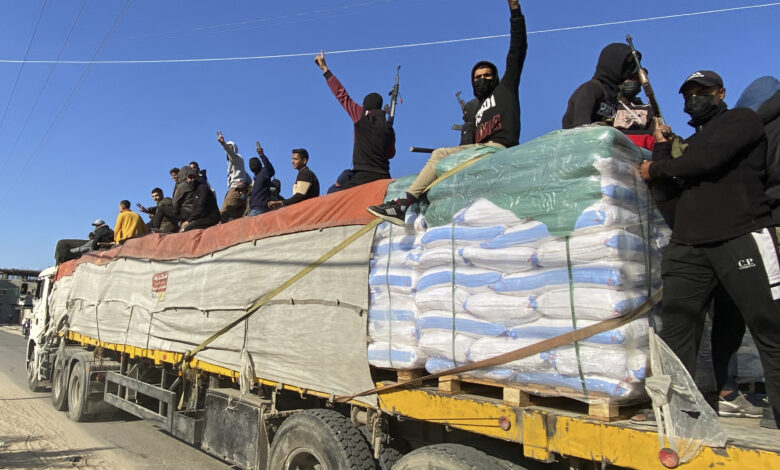Don’t listen to the doubters, history shows Hamas CAN be defeated

“Hamas is an idea.” And you cannot kill an idea.
This is an increasingly popular argument from opponents of Israel’s military campaign in Gaza, such as Palestinian Authority Prime Minister Mohammad Shtayyeh.
It is also wrong.
As the Egyptian government demonstrated in its effort to eliminate the Muslim Brotherhood, the group that gave rise to Hamas a generation ago, ideas wither without organizations to pursue them.
The Egyptian case has special importance because of the ties between Hamas and the Brotherhood, but there’s no shortage of ideas that lost their appeal because their advocates were defeated.
The influence of communism faded quickly after the Soviet Union’s fall.
The Islamic State attracted tens of thousands of young men to its cause, yet its popularity never recovered from the caliphate’s fall at the hands of an American-led coalition.
The Egyptian president and former general, Abdel Fattah el-Sisi, has spent his decade in office working to crush the Brotherhood.
His methods are rough and have resulted in sharp condemnation from American progressives.
Yet today the Brotherhood no longer exists in any meaningful form beyond a web page and a few little-known figures claiming to be leaders while living abroad.
Sisi’s thorough decapitation of the group had little to do with winning a war of ideas.
The government arrested Brotherhood leaders and forced some into exile.
It used extensive force against the group’s militant offshoots.
Perhaps most important, it waged a relentless campaign against the Brotherhood’s domestic recruitment sources by shutting down its educational institutions, intercepting funding from abroad and working through state-controlled media to criminalize Brotherhood ideology.
No question, there are still Egyptians who believe in that ideology.
The group spent decades building and indoctrinating a committed base.
But as Cairo squeezed harder and harder, infighting between the Brotherhood’s leaders in the diaspora caused it to splinter.
Israel is fighting the same enemy.
Hamas is an offshoot of the Brotherhood, which was born in Egypt and inspired dozens of radical branches across the Muslim world.
In 2007, Hamas launched a bloody coup against the Palestinian Authority in Gaza.
The clash left 800 Palestinians dead — some executed by being thrown from the top of buildings — but Hamas prevailed decisively.
Hamas’ then-politburo chief, Khaled Meshaal, called it a “military resolution.”
Western leaders often insist various problems have no military solution, but Hamas, like Russian President Vladimir Putin, knows they often do.
After taking Gaza, Hamas was able to use it as a human shield, from behind which it launched five rounds of fighting with Israel, including the Oct. 7 massacre.
Sixteen years under Hamas has been hell for Gazans.
Thousands did time in jail, where hundreds died or were released with permanent disabilities.
Per the Palestinian Bureau of Statistics, 45% of Gazans are out of work.
Many unemployed youngsters try fleeing by sea, where some end up drowning.
Hamas blames Israel, of course, yet terrorist attacks from Gaza are what necessitate the Israeli effort to isolate the coastal strip.
In its clashes with Israel, Hamas treats the people of Gaza as expendable.
Last month, an interviewer asked top Hamas official Mousa Abu Marzouk why the group builds tunnels to protect its fighters but no bomb shelters for the people.
Marzouk responded that Hamas’ role is to fight, and the United Nations or even Israel should take care of Gazans.
This attitude comes as no surprise to the people.
Gazans took to the streets in July protesting the poor quality of life under Hamas, chanting, “We want to live.”
Despite these setbacks in its own war of ideas, Hamas remains a tough adversary because it controls Gaza’s resources.
Qatar has poured hundreds of millions of dollars per year into the strip — nominally for humanitarian purposes, but Hamas controls the spending.
Extensive UN aid relieves Hamas of the burden of providing a minimal standard of living, so it can prioritize building up its military capabilities with help from Iran’s Quds Force and Lebanese Hezbollah.
Many Arab leaders see Hamas for what it is but fear the costs of siding with Israelis against fellow Arabs.
This narrow thinking has only contributed to Hamas’ power.
At least some regional leaders have stopped condemning Israel’s effort to expel Hamas from Gaza.
Two weeks ago, Bahrain’s crown prince and prime minister, Sheikh Salman bin Hamad al-Khalifa, condemned Hamas “unequivocally.”
Since then, other Gulf leaders have refrained from making unhelpful statements.
The war in Gaza is responsible for great suffering, but Hamas is responsible for the war and for using its people as human shields.
In the long run, a decisive defeat for Hamas is what’s best for Palestinians and the region as a whole, not just Israel.
It would open the door to moderate Arab governments re-engaging with Palestinians, especially the Saudis and Emiratis, who (unlike Qatar) were not interested in backing an Iranian proxy.
A Gaza at peace could begin to rebuild prosperity and ultimately offers the best chance for Palestinians to have a state of their own, beside their Jewish neighbors.
Haisam Hassanein is an adjunct fellow with Foundation for Defense of Democracies, where he analyzes Israel’s relations with the Arab world.




